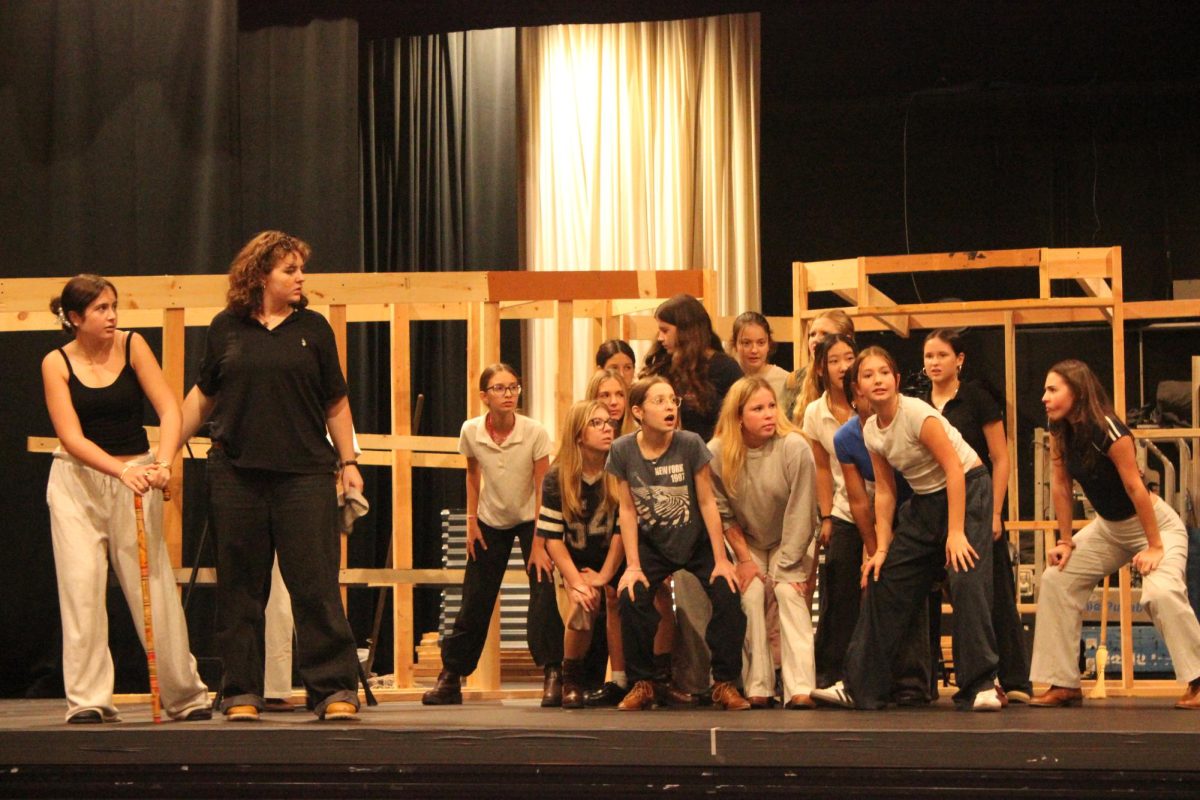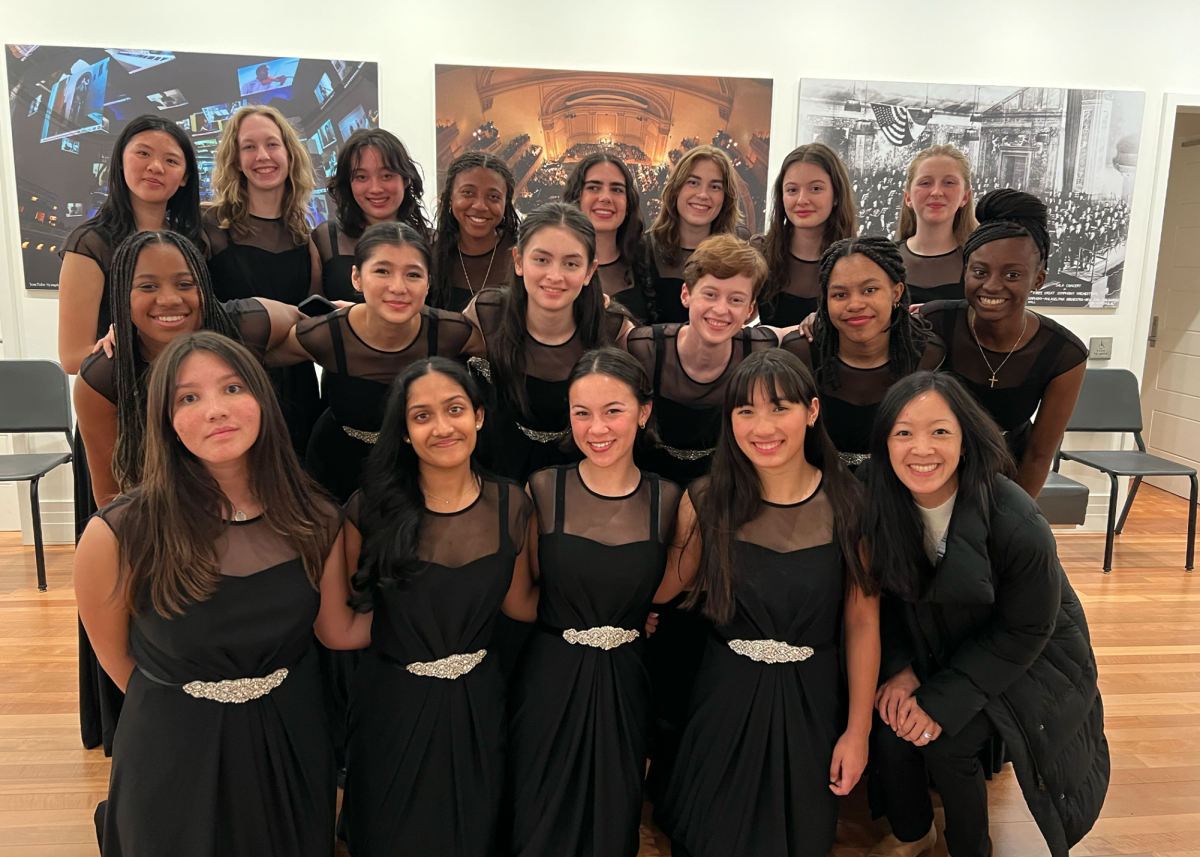With the all-school performance of “Mamma Mia” completed, a smaller theater group, Marlborough’s Ensemble Theater, is gearing up to perform “Machinal,” a play inspired by a real-life story about a woman struggling to fit in with society. The play comments on the experience of being socialized as a woman.
MET, Marlborough’s audition-only acting company performs a show once a year, and this year, they collectively chose “Machinal.” It was the clear frontrunner among the many plays they read as a group.
“The first time we read the show, we knew we would choose it,” cast member Zoe ‘22 said. “We were like, ‘it’s so Marlborough.’ Every Marlborough girl has had a conversation about something in this show.”
Nearly all the cast members also participated in Marlborough’s all-school production of “Mamma Mia,” though the two plays differ significantly.
“For Mamma Mia, we had to be so true to the show, because it’s so close to people’s hearts,” Burke said. “For ‘Machinal’, you’re showing a story and you’re teaching the audience, and letting them feel different emotions. We want to share an experience.”
For many cast members, the small cast of “Machinal” provides the opportunity for experimentation and more personalized focus on acting skills instead of on simply entertaining.
“It’s a more collaborative experience [than ‘Mamma Mia’],” cast member Neve ‘22 said. “Because it’s a smaller group, we have more time to develop our characters. A lot of us are playing multiple smaller characters that only occur in one scene, but we actually get to develop those characters. There is also exploration with what the set will look like, what the characters will look like, even getting to change some of the dialogue in the show.”
However, many of the skills obtained through performing “Mamma Mia,” particularly the body language skills developed from acting with masks, can be carried to “Machinal.”
“In Mamma Mia, I learned to act with my full body with the masks,” Neve said. “The focus on what you do physically will be important for this show, as well, so I’m grateful we have that physicality training under our belts. There are moments of choreography in even just spoken scenes that use the whole body.”
Machinal will be the first Marlborough play to be performed without masks in nearly two years. Lucy ‘22, who plays the lead (the Young Woman), is excited to act maskless.
“It’s been hard to give 110% emotion just because half my face hasn’t been able to be seen because there are so many details and intricacies that come with being able to look at someone’s face. With masks off, this will be the first time in two years where everyone can give all of themselves to a show. I can promise that emotions will be felt by the viewer.”
Even with masks off, the play is challenging for its own reasons, particularly the moral dilemmas the play portrays.
“There are scenes that are very difficult to act in,” cast member Beverly ‘22 said. “There are a lot of characters in the show that are not great people. That can be a difficult experience as an actor to try and get into the head of a character that you don’t necessarily like.”
Hanna finds that the cast supports her through the difficult scenes.
“For me, the biggest thing has been trust, and I trust everyone in the MET group so immensely,” Lucy said. “They help me when I go through hard scenes. I trust they are there to help me and uplift the play. It’s something more available in a ten person cast.”
However, the difficult scenes and the characters’ moral ambiguity complete the play.
“The actions of the Young Woman are very morally gray,” Neve said. “Looking at the play, and thinking about it, you think ‘yeah that’s wrong,’ but by the end of it, or rereading it, you think ‘oh that is completely justified.’ I’m speaking vaguely to not spoil the plot, but the play has this strange power to make you have thoughts or have sympathy that you usually won’t have.”
For Lucy, “Machinal” has fulfilled her experience as an actress because of the personal connection she feels to the narrative and themes.
“There’s a universality to the show, ” she said. “It’s a very extreme situation. It left me wondering after reading and rehearsing the show, how am I relating so much to a woman in the early 20th century. It’s because it brings up questions and truths that I hadn’t really thought about before. I’m getting more out of it than I’m giving. And I’m giving a lot.”
As for the audience, according to cast member Charlotte ‘23, they will leave the show pondering, just as it does the cast.
“You will not walk out of it, after having watched it, with the same mindset going in. That we can promise you.”






